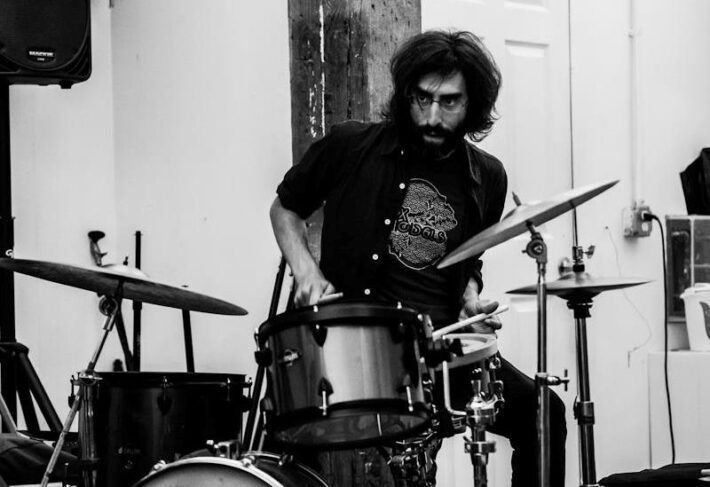

FIVE BEFORE LIVE Q & A with Brian Chase
A new Q&A section posing 5 questions to our artists before their upcoming IMC concert.
Ahead of his collaborative performance with Irish saxophonist Catherine Sikora (read her very own recent interview ahead of her performance at BAN BAM festival here) at SPECTRUM Festival 2018 on Saturday 10th March (in an excting double-header alongside Thunderblender), we spoke to drummer BRIAN CHASE about his music, the artistic process, and the upcoming launch of his own record label! Tickets & Info here
Brian Chase is a drummer and composer living in Brooklyn. His diverse range of work includes that with Grammy nominated rock band Yeah Yeah Yeahs, the community of the New York experimental music scene, and his solo project Drums & Drones.
Q 1. What motivates you, as an artist, to create music?
What motivates me as an artist to create music is the music itself and me being a musician. Just as a scientist deals with the world of science, and a teacher deals with the world of teaching, a musician deals with sound - the world of feelings, ideas, and physicality as expressed and communicated through sound. In this way, art is a very primal and essential part of human nature.
Q 2. Who or what inspires you at the moment - be it in music, arts, politics or your personal life?
What inspires me at the moment is the communicative power of art. There is no shortage of ideas and feelings throughout my day - being a parent, dealing with society, aesthetic concepts, etc. These ideas and feelings often exist in a crude form relative to their ultimate potential in refinement and promise. That gap between the unrefined and the potential of the refined is filled and bridged by the motivation of inspiration - that ‘need’ to create: the ’doing’ aspect of the artistic process.
Q 3. Can you tell us about a seminal experience, project, or encounter that had a significant impact on your career?
One very great thing is when Catherine Sikora took the initiative to reach out to me. It happened through unexpected circumstances: she was driving in her car listening to WKCR (the radio station of Columbia University and an exponent of jazz and classical music) at a moment when I happened to be a guest on the station. I was there presenting my solo project, Drums and Drones, which is a very different style of music than what Catherine and I do. Catherine was intrigued, and, looking into it further, found my website and emailed me through there. I looked her up and found footage of her playing and was like, “Whoa!” I nervously asked if she’d be up for playing. She was, and we found a time to meet up at my practice space in Brooklyn. This was several years ago. It’s amazing how things happen sometimes. The rest is history and now we’re gearing up for this festival appearance and the release of our first album together!
Q 4. Are you working on anything new at the moment? What’s next for you?
A big project coming up for me is the launch of my own label! The notion to do it was presented to me at the encouragement of John Zorn, legendary saxophonist/composer. First up is a triple album and book for a solo project I’ve had for ten years, Drums and Drones; the project takes its initial inspiration for La Monte Young and Marian Zazeela’s famous Dream House installation in NYC. Second up, is the duo album with Catherine Sikora. Excited!!
Q 5. What direction do you see the music industry headed towards in the next 20 years?
My main hope is for the music industry to find a way to achieve fairness in regards to musicians getting paid and the way music is treated online. This also involves audience awareness. As most people know, musicians and the music industry are struggling with music being so readily available online. There are many problems with this. A main one is that much money is going to the ‘middle man’ rather than the artists themselves. If someone is paying for a streaming service then the money goes first to the provider and is then distributed to the artists; what remains for the artist is not much.
To go along with this, music can be expensive to make if someone wants to do it in a nice way! A professional studio provides a room with balanced acoustics, high quality equipment, and the experience of an audio engineer. After recording comes mixing and other post-production which are costly. Artwork and manufacturing can be expensive as well. Once the music is finally ready, for it to then be put online where the music-buying public expect to get it for free or at a low price is not balanced! This model is not sustainable. It is comparable to going to a nice restaurant and expecting the meal to be free or at a low price while the restaurant doesn't get a return on its expenses (ingredients, staff, etc.).
An immediate way to help this situation is to buy music direct from the artists (in person or via a personal website), a record store, or a record label (via website). I hope that in the next twenty years, the music-buying public wakes up to this fact, and also for streaming services to have a more positive attitude to respecting artist’s and musician’s rights. For their to be sustainability there needs to be fairness. We are still relatively new to this ‘internet thing’ so hopefully we’ll start figuring out how to use it in a good way.
Thank, Brian!
Catch Brian Chase & Catherine Sikora at this year's SPECTRUM Festival on Saturday 10th March along side Thunderblender at The Fumbally Stables!
Tickets & Info here


